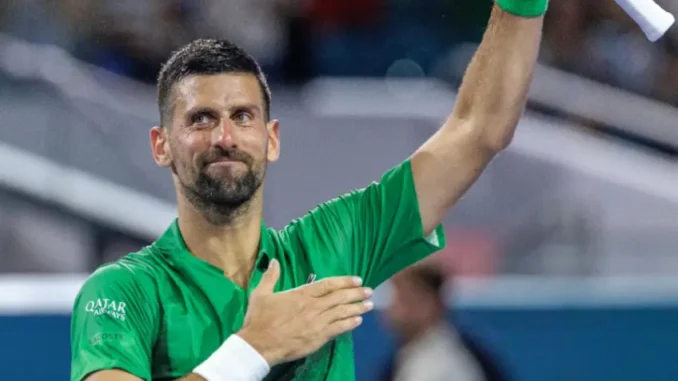
Novak Djokovic, the Serbian tennis titan whose name is synonymous with relentless determination and unparalleled skill, once stood at a crossroads that could have altered the trajectory of his storied career. As the world grappled with the COVID-19 pandemic, the sport he dominated faced unprecedented challenges—none more divisive than the vaccine mandates that swept across tournaments in 2022. At the height of this global upheaval, Djokovic, then the men’s world No. 1, revealed a stance that stunned fans and peers alike: he was prepared to walk away from tennis entirely if getting vaccinated became a non-negotiable condition to keep playing. This wasn’t just a fleeting comment—it was a declaration of principle from a man who’d already etched his name among the game’s immortals, and it’s a moment that still reverberates through the sport as of March 2025.
Djokovic’s journey to that pivotal decision was anything but ordinary. By early 2022, he’d amassed 20 Grand Slam titles, tying him with rivals Rafael Nadal and Roger Federer in a three-way race for greatness. His 2021 season had been a masterclass—winning the Australian Open, Roland Garros, and Wimbledon, only to fall agonizingly short of a calendar Grand Slam at the US Open. Yet, as 2022 dawned, the focus shifted from his on-court heroics to his off-court convictions. Australia, host of the year’s first major, enforced strict entry rules requiring vaccination for all participants. Djokovic, unvaccinated and unwavering, sought a medical exemption based on a recent COVID-19 infection. What followed was a saga that gripped the world: a visa cancellation, a detention in a Melbourne immigration facility, and, ultimately, deportation on the eve of the tournament. “I was ready not to go,” he later reflected, his voice steady with resolve. “The principles of decision-making on my body are more important than any title or anything else.”
That wasn’t the end of the story—it was just the beginning. Djokovic doubled down on his stance in a candid interview, laying bare the depth of his conviction. “Yes, that is the price that I’m willing to pay,” he said, acknowledging that missing marquee events like the French Open and Wimbledon was a real possibility if mandates persisted. For a player who’d spent over 400 weeks atop the ATP rankings—more than anyone in history—the idea of stepping away from the sport he’d mastered was seismic. He wasn’t anti-vaccine, he insisted, distancing himself from that label. “I was never against vaccination,” he clarified, emphasizing his belief in personal choice over blanket mandates. “I’m trying to be in tune with my body as much as I possibly can.” It was a stance rooted in his lifelong dedication to wellness—years of strict diets, meditation, and holistic practices that had fueled his rise to the top.
The fallout was swift and fierce. In Australia, where lockdowns had tested public patience, his presence sparked outrage. Immigration Minister Alex Hawke justified the deportation, arguing Djokovic’s unvaccinated status could stoke anti-vaccine sentiment. Across the globe, opinions split—some hailed him as a champion of individual freedom, others decried him as a reckless outlier in a time of collective need. The tennis world felt the ripple effects too. He missed the 2022 US Open, another casualty of U.S. travel restrictions, watching from afar as Nadal claimed his 22nd Slam in New York. “I understand the consequences of my decision,” Djokovic admitted, a hint of melancholy in his tone. “I am unable to travel to most of the tournaments at the moment.”
Yet, Djokovic’s resolve never wavered. Even as he sat out key events, he kept his eye on the long game. “I keep my mind open,” he said, leaving the door ajar for a future shift if circumstances changed. By 2023, as mandates eased, he roared back—winning the Australian Open and US Open, pushing his Slam tally to 24 and surpassing Nadal’s mark. Now, in 2025, at 37, he remains a force, his legacy a blend of on-court brilliance and off-court defiance. Reflecting on that turbulent period, he expressed no regrets. “I sympathize and empathize with all the people,” he said of those frustrated by his choices, “but I was really sad and disappointed with the way it all ended for me in Australia.”
What drove Djokovic to risk it all? It wasn’t just stubbornness—it was a philosophy forged over decades. A student of health and nutrition, he’d long prioritized control over what entered his body, a discipline that powered his late-career resurgence. “I’ve always been a great student of wellness, wellbeing, health,” he explained, linking his vaccine stance to the same rigor that turned him into a champion. That choice cost him in 2022—two Slams missed, a dent in his pursuit of history—but it also cemented his image as a man who’d rather lose everything than compromise his beliefs.
Today, as the tennis world marvels at his enduring prowess, that chapter remains a defining lens. Djokovic didn’t just weather the storm—he emerged stronger, proving that his readiness to leave wasn’t a bluff but a testament to his unyielding core. Whether chasing more titles or mentoring the next generation, he’s a figure who transcends the sport, a reminder that greatness isn’t just about trophies—it’s about standing tall when the stakes are highest.
Leave a Reply